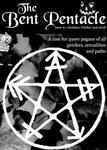The Bent Pentacle zine
type=digital_archives
I've decided to start the Bent Pentacle as an outlet for people to share information, experience and stories of queer paganism with others. I hope it will allow those who identify with queer to see how paganism and spirituality can be relevant to their views on gender and sex, and that it will be of interest to pagans who want more information about what queer could have to do with their path, as well as anyone else with an interest in the queer experience, or pagan spirituality, or both. It is completley DIY, which means noone will be making any money from it at any point and the content will be defined by what people want to contribute to it. This allows it to be a space for anyone who has something to say to contribute, including pieces that wouldn't be published in more mainstream publications.
What is queer paganism? A ridiculously brief introduction
This is a very big question and one that will hopefully be explored in the Bent Pentacle. The terms "Queer" and "pagan" have similarities, in that both of them cover a large range of people, identities and activities, and both of them have often failed concrete definitions. Queer can be used as a synonym for Gay, but there has been a growing global movement that has taken on the word as a kind of "non-identity" that centres around the deconstruction and critique of rigidly defined roles of gender and sexuality and the idea that there are many more than two genders and two (or three) sexualities. There is alot of inspiration from the work of writers such as Michael Foucault and Judith Butler.
Paganism is a loose term describing earth based religion/spiritualities, including witchcraft, shamanism, heathenry, druidry, wicca etc. Many pagans are polytheistic, which means they believe in many gods, many are animistic which means they believe that everything has a spirit, and many do not recognise deity in this way and instead honour the land directly. Versions of wicca became popular in the 1970s, often being primarily, or excluisively, focused on the divine feminine, the Goddess, as a reaction to the male focused and dominated Christian church. Even now, Wicca is the most known branch of paganism currently practiced, though it is by no means the only path available.
Queer Pagans stand at a crossroad between these two ways of thinking and being, with a pagan spirituality that is influenced by queer politics and a queer identity that is influenced by pagan spiritual thought. As both Queer and Pagan are identities that often infuse a person's whole life rather than something someone does that is seperate from their "real life", it is inevitable that they will fuse together to form something related to but different from the original ideas. How these influences manifest themselves is different for each individual, and hopefully these differences can be expressed through the pages of the Bent Pentacle.

